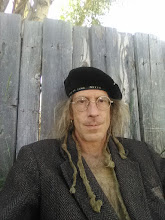-->
Pondering certain memes and meanings
within commonly repeated colloquialisms, the subtle spells sanAtana
dharma weaves into the daily conversation of so many people and
peoples in so many tongues, which keeps them inadvertently tied by
intonation to those most ancient wisdoms, those at least as close as
humanity has to “eternal teachings.” The most obvious little
sacred spell designed to keep humanity in tune with the ancient ways
and vibrations: “God” is derived from the Sanskrit root go,
which means “cow” as in the
Holy Cows graze in the pasture and intone “AUM” backwards, and
which grace humanity willing with their own milk. The simple fact
that another creature, biologically unrelated to humanity save very
distantly, essentially nurses us as if one of their own is at least
analogous to the Providence of the Divine, caring for mere mortals so
seeming separate from the Divine. Thus when people call on “God”
using that English word they are invoking that ancient Deity
worshiped yet in India in the actual form of the bovine beasty, and
in a globally recognized expression of anthropomorphisized or
transcendent Benevolence, in fact even overtly worshiped by most
peoples' ancestors in some guise or other as Bull Gods and other
Sacred Cows.
Every
time Abraham and Sarah are named in a Hebrew prayer their speech
cannot but be recognized as an echo if not occulted invocation of
Brahma and Saraswati, the Creator and His Consort according to
sanAtana dharma, and
at least the namesakes for the Hebrew patriarch and his wife who
indeed came from quite near Indus Valley Civilization before crossing
southern Asia to reach Palestine. When a Muslim speaks the primary
confession of Islam he or she is saying one of the kalima,
a veiled reminder of Kali Ma,
Black Mama Goddess of the Universe according to the teachings of
sanAtana dharma. To the Muslim, “community” is Ummah,
at least vibrationally invoking Uma Himavati, another form of the
Goddess Mama of the Universe. Christians devotion to their Shepherd
is more than analogous to Gopis worship of Krishna the Cowherd, a
functional pattern applied again or copied from sanAtana
dharma. “Yoga” is root to
the English word “yolk,” as in the brace used to tie a horse or
other creature to a cart or a plow. “Allah” without the “h”
is one of Durga's names, thus intonationally Muslims are calling upon
the “HIndu” Goddess of the Universe when they say their “God is
good.”
When a
crowd cheers, “Hooray!! Hoorah!!” their words echo as
“Hari-Hara!!” in fact invoking Vishnu/Hari and Shiva/Hara who in
Hari-Hara form are the Maintainer and Destroyer Avatars of God
sharing One Body. When in the Spanish tongue a woman is called
“mamasita” those
syllables intoned invoke Devi Ma Sita, Wife of God Rama who is
another form of Vishnu/Krishna. Devi Sita is an Avatar of Prithvi,
Mother Earth, and is said by the Ramayana
to be a small framed woman. So indeed in some guise Mother Earth is
worshiped by the Spanish when they call someone mamasita/“little
mama.” An Aztec Native American Indian calls himself or herself
“Astika” which in
India's sacred speak Sanskrit means “faithful one, or one who
believes in the existence of God/another world.”
Despite
whatever theological or cultural tangent, placed within the words and
ways of common people everywhere remain means of tying the whole show
together, to maintain those strands of sacred stories and names yet
woven through virtually every culture and mythology which call upon
the most ancient and abiding, sanAtana dharma.
Thus despite overt grand differences between peoples, such spells
spun by Lalitha or whatever Devi or Deva within whatever peoples'
ways remind them or the spirit within them, however unacknowledged
consciously, of their kinship and connections to the others and to
the same ancient sacred stories and ancestral understandings of the
Divine. At least over the last five to ten thousand years there is
indeed a coherent and unified narrative of the drama and dharma of us
all and our ancestors, and spells woven within everyone's words in
every tongue, that has been and shall continue “keepin' it together
forever,” sanAtana dharma.






No comments:
Post a Comment